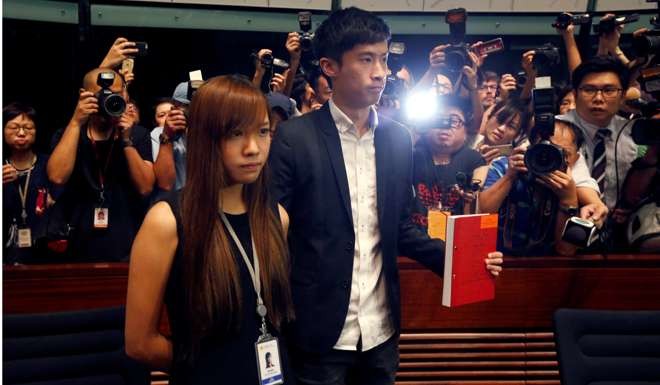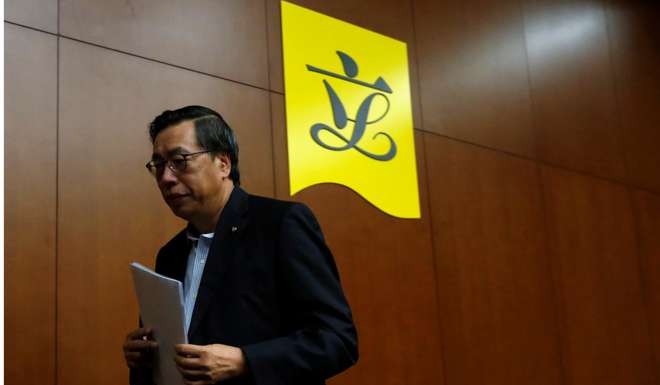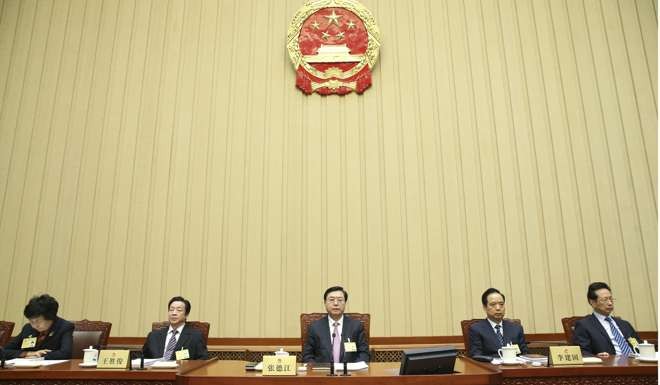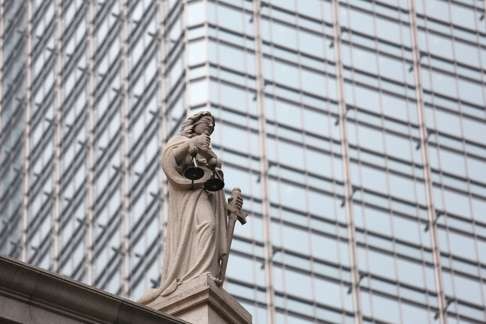Hong Kong will pay a heavy price for yet another Basic Law interpretation
Cliff Buddle fears that a looming intervention by the NPC Standing Committee to resolve the Legislative Council oath-taking row – through a fifth interpretation – will further erode the city’s autonomy and undermine the rule of law
PUBLISHED : Thursday, 03 November, 2016
In one convenient swoop, an interpretation of the Basic Law by Beijing could settle many of the issues raised in recent weeks concerning pro-independence lawmakers and their oaths. It might even restore some much-needed order to the Legislative Council. But such an intervention by the central government would come at a heavy cost.
Beijing interpretation on Legislative Council oath taking rattles Hong Kong
An interpretation delivered by the National People’s Congress Standing Committee would effectively decide issues which are already before Hong Kong’s courts. It would render the proceedings which began in the Court of First Instance yesterday pointless and, in doing so, undermine confidence in the city’s separate legal system and rule of law.
The move would strike a blow to Hong Kong’s high degree of autonomy under the Basic Law and tilt the delicate balance between “one country” and “two systems” further towards the former. A sorry saga, which began with puerile and offensive comments made by newly elected lawmakers with pro-independence leanings when requested to make their oaths, has taken on grave constitutional implications.

Mainland paper slams Hong Kong independence advocates in 1,000-word commentary
The central government is, understandably, concerned about the rise of an independence movement in Hong Kong. We are no longer talking about idle words by a few young people. Now, advocates of independence are winning sufficient votes in elections to secure entry to Legco.
But there is no reason why Hong Kong cannot deal with such matters on its own. That, after all, is the essence of the “one country, two systems” arrangements which have governed the city since its return to China almost 20 years ago.
The hope and expectation among Hong Kong officials and politicians on both sides of the political divide has been that the issues are settled by the city’s own institutions. Unlike previous Standing Committee interpretations in 1999 and 2005, there has been no formal request from the Hong Kong government. This time, it seems, any interpretation will be initiated by Beijing.
At the opening of the court case yesterday, Senior Counsel Benjamin Yu, for the government, informed the judge that the administration’s position is that “the issues in question can and should be resolved within the [Hong Kong] judicial system”. Elsie Leung Oi-sie, vice-chairwoman of the Basic Law committee, which advises the Standing Committee on interpretations, expressed similar views before the oath-taking controversy erupted.

In at the deep end for newly elected Legco president
Initially, it seemed, the question of how to handle the failure by Youngspiration’s Sixtus Baggio Leung Chung-hang and Yau Wai-ching to take their oaths would be settled by the Legco president. The government’s decision to bring a legal challenge to his decision to allow them a second chance to take the oath set the executive and legislature on a collision course in court.
But this, at least, provided the city’s independent judges with an opportunity to settle the legal position. The process involves a public airing of arguments on all sides and the delivery of a ruling based on principles and precedents.
The case would almost certainly end up in the Court of Final Appeal. At that point, the judges would have to decide whether or not to refer the case to the NPC Standing Committee for an interpretation of relevant parts of the Basic Law.
Beijing interpretation on Legislative Council oath taking rattles Hong Kong
It is possible that the outcome would, ultimately, be the same as that which would follow an interpretation in the coming days. But by following the judicial process, Hong Kong’s high degree of autonomy would be maintained. Any interpretation from Beijing would come at the request of the courts, rather than being imposed on the judges before they have an opportunity to give judgment.
Alternatively, the courts might rule against the government. They may refuse to get involved in the oath-taking issue, regarding it as a matter for Legco under the separation of powers provided for in the Basic Law. Perhaps they would decide there was no need to refer the matter to the Standing Committee because it falls within Hong Kong’s autonomy and is therefore to be decided by the courts alone. Or they might take the view that the case could be settled by reference to local legislation, without any need for anyone to interpret the Basic Law. If Beijing issues an interpretation now, we will never know.
This expedient move would deny the parties the opportunity to follow the judicial process laid down by the Basic Law
By doing so, the Standing Committee would avoid such inconvenient outcomes. It could sidestep potentially lengthy legal proceedings. But this expedient move would deny the parties – in this case the Hong Kong government, the legislature and two democratically elected lawmakers – the opportunity to follow the judicial process laid down by the Basic Law.
Such a step would have been unthinkable at the time of the 1997 handover. A reading of the Basic Law suggests that the Standing Committee can only issue an interpretation at the request of the Court of Final Appeal.
That assumption was, however, shattered by the first Standing Committee interpretation in 1999, which was at the request of the Hong Kong government. It effectively overturned a ruling by the Court of Final Appeal on the right of abode, causing much controversy and concern.
The second interpretation, in 2004, was initiated by Beijing and imposed new rules for democratic development here, curbing the city’s autonomy in the process. In 2005, a third interpretation, again at the request of the Hong Kong government, came after a legal action had been filed, but not heard, concerning the length of the chief executive’s term. The last one, in 2011, was at the request of the court.

Hong Kong’s top legal body ‘deeply concerned’ over mainland intervention in oath-taking saga
Such is the sensitivity concerning Standing Committee interpretations, that an understanding appeared to have been reached that they would only be delivered in exceptional circumstances. Perhaps the central government regards the nascent independence movement in Hong Kong as one of those rare occasions.
But the ability of Hong Kong’s courts to decide the outcome of cases independently is pivotal to the success of the “one country, two systems” concept.
This was recognised by the drafters of the Basic Law, who gave Hong Kong’s judges the final say in court battles. It is upon this foundation that confidence in the city’s separate system depends.
The overwhelming majority of Hong Kong people do not support independence. Most disapprove of the conduct of the two localist lawmakers when asked to take the oath. But there is widely-held concern about a gradual erosion of the city’s values and its high degree of autonomy, especially where the role of the courts is concerned. This should not be forgotten as the 20th anniversary of the handover approaches, and further challenges arise.
http://www.scmp.com/comment/insight-opinion/article/2042637/hong-kong-will-pay-heavy-price-yet-another-basic-law

沒有留言:
張貼留言